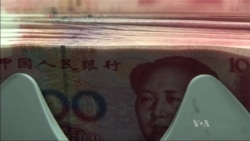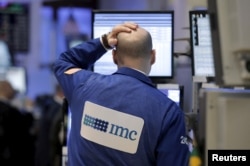What, me worry? If you were a fly on the wall Thursday at the China Economic Forecast annual event in New York, you would think that everything in China was going well.
Even though the Chinese stock market took a big hit twice in the last week, and the economic forecast for annual growth in China is at the lowest point in many years — down to under 7 percent — some delegates to the National Committee on U.S.-China Relations meeting had a positive outlook.
"Fundamentally, the capital will come back to China's economy and will continue to grow strongly. Fundamentally, the gross product is one of the best in the world," said Justin Yifu Lin, former World Bank chief economist and senior vice president.
Lin, the keynote speaker at the forum, said Thursday the recent rise in U.S. interest rates may have had an effect on the Chinese stock market by attracting investment capital away from China.
"There are some signs of slowing down in China," he said, "and people are still trying to assess the effect of the interest rates in the United States and in this process people certainly get more nervous."
He added that China now is gradually moving toward a service-oriented economy, so the decline in the manufacturing sector and employment is balanced by the increase in the service sector and its employment.
Economic cycles
A different explanation came from Lu Feng, Director of the China Macroeconomic Research Center at Peking University. Feng told VOA that "every country goes through cycles. China cannot be the exception."
He added, "In the last 20 years, China has had four major business cycles: 1992-1997, 1998-2003, then there was a long period of hyper-growth." Feng said there is a new cycle now.
"Since 2012, we have entered a bursting [bubble] cycle,” he said. “If a seven-year cycle is a kind of corrective prediction for the Chinese economy, this year is going to be the bottom of the bursting cycle."
Crisis, or not?
There's absolutely no panic involved in China, says Stephen Orlins, president of the National Committee on U.S.-China Relations. In fact, he thinks there's been more overreaction on the part of U.S. markets.
"I think you have to understand the Chinese stock market and the Chinese economy have been on separate tracks forever," Orlins said. "For years, as the economy raced along, the Chinese stock market didn't go up, and then, as growth has somewhat decreased, the market kind of soars."
Is there a crisis? Not according to Orlins.
"I don't think it's in crisis,” he said. “I think, in terms of economies in the world, it's relative and China is one of the strongest. It is certainly one of the largest economies in the world and its growth remains, even at a lower level, a lot faster than the United States."
One person who thinks there is a crisis coming is Hungarian-born American heavyweight billionaire investor George Soros. He advised investors to exercise caution in light of the Chinese market declines this week.
"When I look at the financial markets, there is a serious challenge which reminds me of the crisis we had in 2008," Soros said.















